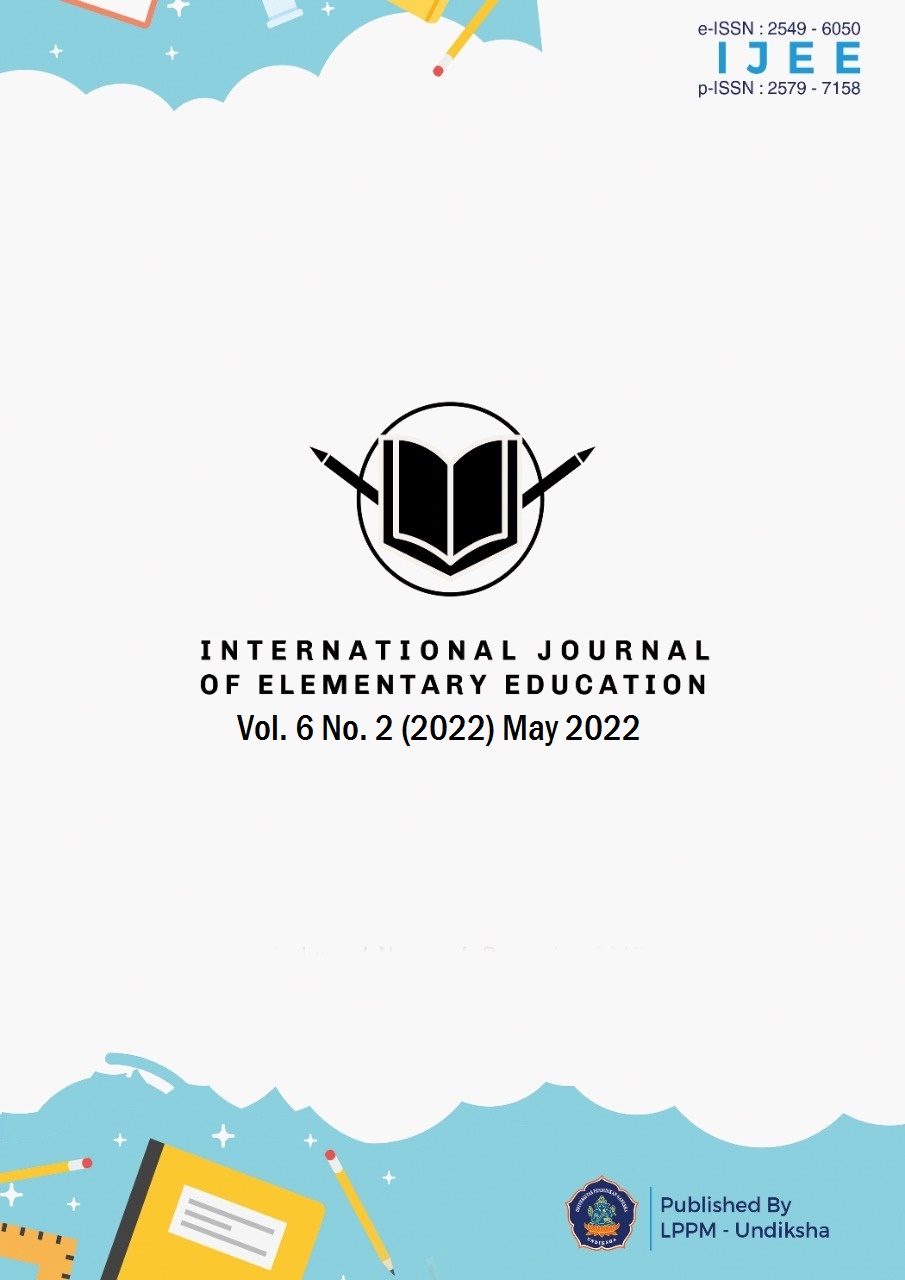The Impact of Brain Based Learning Strategy on Mathematical Communication Ability of Grade V Elementary School Students
DOI:
https://doi.org/10.23887/ijee.v6i2.46651Keywords:
Learning Strategy, Brain Based Learning, Mathematical Communication AbilityAbstract
Most students think of mathematics as a complicated and burdensome subject, so there tends to be a lack of interest in studying mathematics. Mathematical communication skills become one of the important things in learning. Therefore, so that math learning like, need made an effort to adopt learning strategies that can improve. Mathematical communication skills of elementary school students. This study aims to determine the differences in which learning strategies result in higher mathematical communication skills between students and students Brain Based Learning with conventional learning strategies. This research is a type of quasi-experimental research (quasi-experimental). Sampling with cluster random sampling technique. The data analysis technique used normality, homogeneity, hypothesis testing and statistical hypotheses. The conclusions of this study are as follows: 1). An increase in the average value of 58.15 experienced by the experimental class with Brain Based Learning strategy higher than the average value of the control class of 14.9. So that the mathematical communication skills of students in the experimental class in mathematics experienced a significant increase compared to the control group; 2). The results of statistical calculations obtained t count is 8.25 and the value of t table is 1.99 which is smaller than the value of t count, so Brain Based Learning strategy has a positive impact on the mathematical communication skills of class V in mathematics learning.
References
Adiansha, A. A., & Sumantri, M. S. (2017). The Effect of Brain Based Learning Model and Creative Thinking on the Ability of Mathematics Concept of Elementary Students. Journal of Educational Research, 5(12), 1195–1199. https://doi.org/10.12691/educatio n-5-12-4.
Al-Balushi, K., & Al-Balushi, S. (2018). Effectiveness of Brain Based Learning for Grade Eight Students’ Direct and Postponed Retention in Science. International Journal of Instruction, 11(3), 525–538. https://doi.org/10.12973/iji.2018.11336a.
Amalia, R., & Saumi, F. (2018). Penerapan Model Brain Based Learning Berbasis Pendekatan Saintifik dengan Cabri 3D pada Materi Geometri Untuk Meningkatkan Kemampuan Komunikasi Matematis Speserta didik SMAN 2 Kejuruan Muda. Jurnal Dimensi Matematika, 1(1), 7–13. https://ejurnalunsam.id/index.php/JDM/article/view/988.
Bambang, R. (2016). Dasar-Dasar Pembelanjaan Perusahaan. BPFE-Yogyakarta.
Deswita, R., & Kusumah, Y. S. (2018). Peningkatan Kemampuan Komunikasi Matematis Siswa Melalui Model Pembelajaran CORE dengan Pendekatan Scientific. Edumatika: Jurnal Riset Pendidikan Matematika, 1(1), 35–43. https://doi.org/10.32939/ejrpm.v1i1.220.
Fauzia. (2021). Pengaruh Pembelajaran Brain Based Learning Berbantuan Macromedia Flash terhadap Peningkatan Kemampuan Komunikasi Matematis Siswa. J-KIP (Jurnal Keguruan Dan Ilmu Pendidikan), 2(3), 103–110. https://doi.org/10.25157/j-kip.v2i3.6139.
Hadi, S., & Novaliyosi. (2019). TIMSS INDONESIA (Trends In International Mathematics And Science Study). Prosiding Seminar Nasional & Call for Papers.
Jensen, E. (2011). Brain Based Learning. Pustaka Pelajar.
Kusuma, A. P., Rahmawati, N. K., & Ramdoni. (2020). The Application of the Accelerated Learning Cycle, Brain- based Learning Model, and Direct Instruction Model toward Mathematical Reasoning in Terms of Mathematical Communication. Al-Jabar: Jurnal Pendidikan Matematik, 11(1), 21 – 28. https://doi.org/10.24042/ajpm.v11i1.6185.
Lestari, A., Rahayu, W., & Sampoerno, P. D. (2021). Pengaruh Model Brain Based Learning terhadap Kemampuan Koneksi Matematis Siswa SMA ditinjau dari Self-Regulated Learning. JRPMS (Jurnal Riset Pembelajaran Matematika Sekolah), 5(1), 28–37. https://doi.org/10.21009/jrpms.051.04.
Maulani, D., Suyono, & Noornia, A. (2017). Pengaruh Penerapan Model Reciprocal Teaching Terhadap Kemampuan Komunikasi Matematis ditijau dari Self-concept Siswa di SMAN Kecamatan Tambun Selatan Bekasi. JPPM (Jurnal Penelitian Dan Pembelajaran Matematika), 10(2), 14–24. https://doi.org/10.30870/jppm.v10i2.2026.
Mukhlis, A. (2016). Pembelajaran Tutor Sebaya: Solusi Praktis dalam rangka menyongsong pembelajaran sastra yang menyenangkan bagi siswa SM. JP-BSI (Jurnal Pendidikan Bahasa Dan Sastra Indonesia), 1(2), 68–72. https://doi.org/10.26737/jp-bsi.v1i2.93.
Musfiroh, T., & Listyorini, B. (2016). Konstruk kompetensi literasi untuk siswa sekolah dasar. Litera, 15(1). http://staffnew.uny.ac.id/upload/198605272008122002/lainlain/jurnal litera konstruk kompetensi literasi siswa SD.pdf.
Muslimahayati, M. (2019). Kemampuan Komunikasi Matematis Siswa dengan Pendekatan Pembelajaran Matematika Realistik bernuansa Etnomatematika (PMRE). Jurnal Pendidikan Matematika RAFA, 5(1), 22–40. https://doi.org/10.19109/jpmrafa.v5i1.3773.
NCTM. (2000). Principles and Standards for School Mathematics (PSSM). Journal of Equine Veterinary Science, 18(11), 719. https://doi.org/10.1016/s0737-0806(98)80482-6.
Nenden. (2020). Peningkatan Kompetensi Pedagogik Guru SD Negeri Karsamenak Kota Tasikmalaya melalui Penggunaan Media ICT (Information and Communication Technology). J-KIP (Jurnal Keguruan Dan Ilmu Pendidikan), 1(2), 63–70. https://doi.org/10.25157/j-kip.v1i2.4404.
Nilawati., Duskri, M., & Sari, N. T. (2019). Peningkatan Kemampuan Komunikasi Matematis Melalui Model Brain Based Learning Pada Peserta didik MTs. MaPan: Jurnal Matematika Dan Pembelajaran, 7(1), 85–98. https://doi.org/10.24252/mapan.2019v7n1a7.
Oktaviani, M., Rahayu, W., & Sutisna, A. (2019). Kemampuan Koneksi Matematis Peserta Didik Ditinjau dari Bentuk Tes danDisposisi matematis. JPPM (Jurnal Penelitian Dan Pembelajaran Matematika), 12(2), 213–225. https://doi.org/10.30870/jppm.v12i2.6158.
Purnama, F. (2016). Penerapan Model Brain Based Learning (BBL) Dalam Pembelajaran Matematika Untuk Meningkatkan Kemampuan Berpikir Kreatif Matematis Siswa SMP. Universitas Pasundan.
Putrawan, A. A., & Suharta, I. G. P. (2014). Pengembangan perangkat pembelajaran matematika dengan pendekatan scientific berbantuan geogebra dalam upaya meningkatkan keterampilan komunikasi dan aktivitas belajar matematika siswa kelas VIII SMP. Jurnal Pendidikan Dan Pembelajaran Matematika Indonesia, 3(1). https://doi.org/10.23887/jppm.v3i1.1139.
Saparudin, D., & Effendi, K. (2019). Kemampuan Komunikasi Matematis pada Peserta Didik SMP Kelas VII terhadap Materi Bangun Dimensi Tiga. Prosiding Sesiomadika, 687–694.
Saputra, D., Yulianti, Y., & Juwita Agustina, W. (2019). Penerapan Model Brain Based Learning Bernuansa Lingkungan Sekitar dalam Meningkatkan Pemahaman Siswa Pada Pembelajaran Ipa Di Kelas V Sekolah Dasar. Jurnal Lensa PENDAS, 4(1), 1–9. https://doi.org/10.33222/jlp.v4i1.480.
Sari, S. L., Hidayati, D. W., & Wahyuni, A. (2019). Penerapan Strategi Brain-Based Learning Berbantuan Geogebra Terhadap Kemampuan Berfikir Kreatif Siswa. Square: Journal of Mathematics and Mathematics Education, 1(1), 13. https://doi.org/10.21580/square.v1i1.4038.
Setiani, A. (2018). Penerapan Pembelajaran Brain Based Learning Untuk Meningkatkan Hasil Belajar Matematika Siswa SMP. Symmetry | Pasundan Journal of Research in Mathematics Learning and Education, 3(1), 08–16. https://doi.org/10.175 09/jpi.v2i1.10680.
Setyoningrum., Sukestiyarno., & Eko. (2020). The Development of Independent Learning Through Brain Based Learning Assistance to Improve Grit and Mathematical Connection Ability. Journal of Primary Education, 9(2), 152–160. https://doi.org/10.15294/jpe.v9i2.36382.
Solihah, S., Hendriana, H., & Maya, R. (2018). Enhancing The Mathematical Communication Ability and Self-confidence of Junior High School Students Using Brain-Based Learning. Mathematics Education Journals, 2(2), 75–82. https://doi.org/10.22219/mej.v2i2.6491.
Solihat, A., Panjaitan, R. L., & Djuanda, D. (2017). Penerapan Model Pembelajaran Brain Based Learning. Jurnal Pena Ilmiah, 2(1), 451–460. https://doi.org/10.17509/jpi.v2i1.10680.
Ulfa. (2020). Kemampuan Koneksi Matematika Dan Berpikir Kritis Speserta didik Dalam Pembelajaran Matematika Melalui Model Btrain-Based Learning. Jurnal Pendidikan Matematika, 6(2), 106–116. https://doi.org/10.33474/jpm.v6i2.5537.
Wigati. (2017). Deskripsi Penggunaan Otak Kiri Dan Otak Kanan Pada Pembelajaran Matematika Materi Pola Bagi Siswa SMP. Jurnal Mitra Pendidikan, 1(10), 1021–1030. https://doi.org/10.52160/e-jmp.v6i3.
Wijayanto, A. D., Fajriah, S. N., & Anita, I. W. (2018). Analisis kemampuan komunikasi matematis siswa smp pada materi segitiga dan segiempat. Jurnal Cendekia: Jurnal Pendidikan Matematika, 2(1), 97–104. https://doi.org/10.31004/cendekia.v2i1.36.
Downloads
Published
How to Cite
Issue
Section
License
Copyright (c) 2022 Winda Amelia, Venni Herli Sundi, Asep Supena, Yufiarti Yufiarti

This work is licensed under a Creative Commons Attribution-ShareAlike 4.0 International License.
Authors who publish with the International Journal of Elementary Education agree to the following terms:
- Authors retain copyright and grant the journal the right of first publication with the work simultaneously licensed under a Creative Commons Attribution License (CC BY-SA 4.0) that allows others to share the work with an acknowledgment of the work's authorship and initial publication in this journal.
- Authors are able to enter into separate, additional contractual arrangements for the non-exclusive distribution of the journal's published version of the work (e.g., post it to an institutional repository or publish it in a book), with an acknowledgment of its initial publication in this journal.
- Authors are permitted and encouraged to post their work online (e.g., in institutional repositories or on their website) prior to and during the submission process, as it can lead to productive exchanges, as well as earlier and greater citation of published work. (See The Effect of Open Access)










